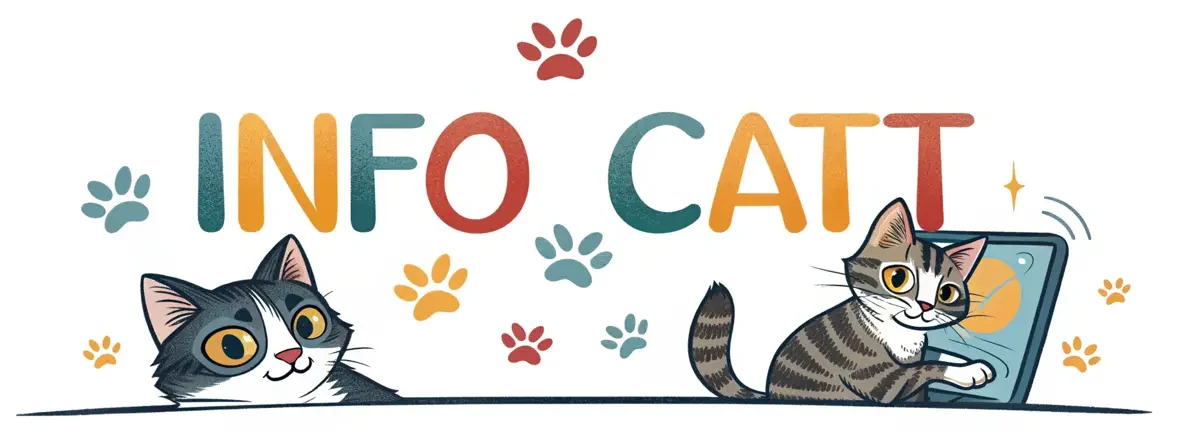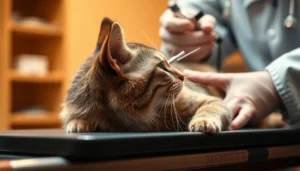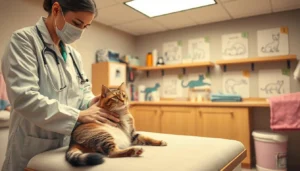Every cat owner has felt that panic when their pet starts shaking. Why is my cat shaking? This sudden trembling worries any pet parent. It can range from a slight quiver to more intense shaking.
Cat trembling can have many causes, some harmless, others serious. Knowing the reasons helps figure out if your cat needs help or is just fine.
There are many reasons for cat shaking, from environmental factors to health issues. Paying close attention and acting fast can help your cat a lot.
Understanding Common Causes of Cat Shaking and Trembling
Cat owners often worry when they notice their feline companion shaking or trembling. Knowing why cats shake can help you figure out if it’s normal or if they need a vet. Cats shake for many reasons, from cold weather to feeling scared.
Cats are very sensitive and have complex bodies and feelings. Shaking can show different signs, helping you understand what’s going on with your pet.
Cold Temperature and Environmental Factors
Your cat might shake or shiver in cold places. Just like us, cats can get cold and tremble as a natural response. Look for these signs:
- Visible shivering
- Hunched posture
- Seeking warm spots in the house
Fear and Anxiety Responses
Stress can make cats shake and have muscle spasms. Loud noises, new places, or sudden changes can make them tremble. Watch for these signs of anxiety:
- Trembling during thunderstorms
- Shaking when meeting new people
- Visible tension in body language
Physical Exertion and Exercise
Sometimes, shaking after sleep or play is normal. Cats might shake a bit after:
- Vigorous play sessions
- Hunting or chasing activities
- Extensive stretching
Always observe your cat’s overall behavior and consult a veterinarian if shaking appears unusual or persistent.
Medical Conditions That Cause Feline Shaking
Neurological issues in cats can show up as shaking and twitching. Your cat might have tremors that mean they need a vet. Knowing these health issues can help you see when your cat needs a doctor.
Several serious medical conditions can cause cat shaking:
- Neurological disorders affecting brain function
- Feline anxiety symptoms causing involuntary muscle reactions
- Metabolic imbalances disrupting nervous system coordination
- Seizure-related neurological complications
My cat is twitching might mean they have a bigger health problem. Some common neurological issues in cats include:
- Epilepsy: Characterized by recurring seizures and unexpected muscle movements
- Vestibular Disease: Affecting balance and causing uncontrolled shaking
- Cognitive Dysfunction: Common in senior cats, producing unusual trembling behaviors
Veterinary tests like neurological exams, blood work, and brain imaging can find the cause. Don’t ignore tremors or sudden changes in your cat’s movements.
Early detection and professional medical intervention can significantly improve your cat’s prognosis and quality of life.
Why Is My Cat Shaking: Serious Symptoms to Watch For
It can be hard for pet owners to know when to worry about a shaking cat. Not all shaking is a big deal, but some signs need quick action. It’s important to tell the difference between normal shaking and serious health issues.
Some signs mean you should worry about your cat’s shaking. If your kitten is shaking and won’t eat, it could be a big problem. This needs a vet’s check right away.
In other hand i see the shaking and fast breathing can sometimes appear together—learn more about why your cat might be breathing fast.
Emergency Warning Signs
Watch for these serious signs that mean you need to see a vet fast:
- Persistent shaking lasting more than a few hours
- Shaking accompanied by loss of appetite
- Uncontrollable tremors or seizure-like movements
- Extreme lethargy or weakness
- Visible pain or discomfort
When to Contact Your Veterinarian
If your cat keeps shaking its head and ears, it might be a sign of a problem. Call your vet if you see:
- Continuous head tilting
- Unusual ear scratching
- Balance problems
- Neurological symptoms
Distinguishing Normal vs. Abnormal Shaking
Not all shaking is bad. Normal shaking can happen from:
– Feeling cold
– Minor excitement
– Light stress
Abnormal shaking includes:
– Intense, prolonged tremors
– Shaking with other concerning symptoms
– Unexplained weight loss
– Changes in behavior
Always trust your instincts. If something seems off with your cat’s health, it’s best to get a vet’s opinion.
Treatment Options and Home Care for a Shaking Cat
Seeing your cat shiver is a worrying sign. It’s important to know how to help. You need to think about both their physical and emotional health.
For cats shaking from stress or cold, making their environment cozy is essential. Here are some steps to take at home:
- Provide a warm, quiet space away from loud noises
- Use soft blankets to help regulate body temperature
- Minimize sudden environmental changes
- Maintain a consistent room temperature
If your cat is shaking due to anxiety, try these calming methods:
- Use pheromone diffusers to reduce stress
- Create a predictable daily routine
- Offer gentle physical comfort
- Use quiet, soothing tones when interacting
While home care is helpful, shaking that doesn’t stop needs a vet’s help. A vet can find out why your cat is shaking and suggest the best treatment. They can check for serious health issues and give advice tailored to your cat.
Remember: Your cat’s health and comfort are always the top priority.
If your cat keeps shaking or shows other signs of illness, take them to the vet. This ensures they get the care they need.
Conclusion
Knowing why your cat shakes is key to their health. Shaking can mean different things, like environmental issues or health problems. Older cats need extra care because they’re more likely to get sick.
Watching your cat closely and acting fast is important. If you see them shaking, notice how long it lasts and what’s happening. Call your vet if the shaking doesn’t stop or if they show other signs of illness.
Senior cats shaking suddenly need to see a vet right away. Age can affect their muscles and nerves, making vet visits crucial. Catching problems early can really help your cat live better.
Being aware and taking action can keep your cat happy and healthy. Listen to your gut, watch your cat’s behavior, and always seek vet advice when something’s off.
FAQ
Why is my cat suddenly shaking?
Cats shake for many reasons. It could be because of cold, fear, or anxiety. It might also be from physical activity or a health issue. Watching how your cat acts can help figure out why.
Could shaking be a sign of a serious health problem?
Yes, shaking can mean serious health problems. This includes neurological issues, pain, fever, or metabolic problems. If your cat shakes a lot, is tired, won’t eat, or acts strangely, see a vet right away.
Is it normal for cats to shake while sleeping?
It’s okay if your cat twitches a little while sleeping. It might be because they’re dreaming. But if they shake a lot or seem upset, talk to your vet.
Can stress cause my cat to shake?
Yes, stress can make cats shake. This can happen when their environment changes, they meet new pets, or there’s loud noise. Changes in their routine can also cause it.
How can I tell if my cat is shaking from being cold?
If your cat shakes because it’s cold, they’ll shiver and look for warmth. Try giving them a warm blanket, turning up the heat, or a heated bed.
When should I be worried about my cat’s shaking?
Call your vet if your cat’s shaking:
– Doesn’t stop
– Comes with other symptoms such as vomiting or weakness
– Looks painful or upset
– Happens often or without reason
Could my cat’s medication be causing the shaking?
Some meds can make cats shake or tremble. If you think this is why, talk to your vet. They might change the medication or find another option.
Are older cats more prone to shaking?
Yes, older cats shake more because of age. This can be due to neurological issues, arthritis, or muscle weakness. Regular vet visits are key as your cat gets older.



